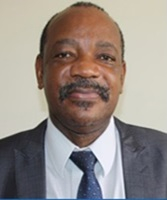
SIFUNI ERNEST MCHOME
YEAR OF MATRICULATION: 1985
EDUCATION:
One of a few individuals clad, in the previous decade, with a number of institutional roles in teaching, professional tutoring and public service inside and outside the walls of the University’s School of Law, Professor Sifuni Ernest Mchome is a past graduate—an alumnus—of the University of Dar es Salaam, of the graduating class of 1989.
He was born on the 9th of October 1963 in the northern region of Arusha and had both his elementary and his secondary schooling there: at Uhuru Primary School (1971–1978); Arusha - Meru and Kolila Secondary Schools (for the Certificate of Secondary Education Examination [CSEE],i.e. forms 1-4, 1979-1982); and Ilboru High School (for the Advanced Certificate of Secondary Education Examination, ACSEE,1983–84). It was from Ilboru high school that he qualified, in 1985,for entry into the University of Dar es Salaam for a degree programme in lawat the Faculty of Law [now School of Law]. He graduated in 1989 with an LLB honours degree and was, in May that year, posted tothe zonal office of the Attorney General’s Chambers in Arusha, beginning as a state attorney trainee (May 1989–April 1990) and thereafter as state attorney (May–August 1990).In September 1990, he relocated to the University of Dar es Salaam where he joined the Faculty of Lawas a tutorial assistant and was subsequently sponsored for a two-year postgraduate study at Queen’s University Ontario in Canada, earning a master of laws degree in 1991.
From 1990, well up to 2009, Sifuni had a continuous stretch of service with the University atthe Faculty of Law, rising through the academic ranks from tutorial assistant (1990-1992), to assistant lecturer (June1992-May 1997), to lecturer (June 1997-May 2001), to senior lecturer (June 2001-May 2006) and to associate professor (June 2006-to-date). During this period of 17 years, he served in various capacities and roles: teaching, researching, as well as consultancy with various groups and organisations in and outside the university setting. Within the Faculty, for a whole stretch of ten years (from 1995 to 2005), he was coordinator of ‘moot courts’ - awell-known system of exciting practical sessions that depict imaginary law cases for student practice and demonstration. He also served as Associate Dean for administration (July 1997-June 2002), Head of the Department of Civil & Criminal Law (July 2001-June 2006) and Faculty Dean (July 2006-June 2009). This was in addition to another, equallyheavy “personal” academic load of his own doctoral study programme, which he finally completed in 2001.
In April 2010, Professor Mchome was appointed Deputy Executive Secretary for the Tanzania Commission for Universities (TCU), a national statutory body established in 2005 body for regulating and enhancing quality education programmes in universities in the country. He subsequently became Executive Secretary for the body from January 2011 to August 2013, when he was appointed to an even higher position in government, of Permanent Secretary in the Ministry of Education and Vocational Training (August 2013-December 2015). In January Sifuni Ernest MCHOME 2016, he was appointed Permanent Secretary to the Ministry of Constitutional and Legal Affairs, a position he held for six years from January 2016 to January 2022. It was, so to say, a long tour of twelve years of duty outside the university environment that in April 2022, he returned to the fold at the University of Dar es Salaam’s School of Law (UDSoL) to continue with university duties. Beginning with May 2022, to date, Professor Mchome relocated to the University of Dodoma (UDOM) where he is teaching and researching at the School of Law.
An ardent writer, Professor Mchome has to his credit not less than forty works in various areas of law interpretation and application. For lack of space, only four publications can be mentioned here: • “Due Process of Law: The Rights of Suspects and Accused”. In Peter, C.M and Juma, I.H (Eds), Fundamental Human Rights in Tanzania. Dar es Salaam: Mkuki na Nyota Publishers (1998); • “Is the Refugee Problem Ending? A Historical Perspective”. In Nyerere Law Journal (2005); • “Constitutional Developments in Tanzania: Implications of the Proposed 14th Amendments of the Union Constitution and other Developments with Constitutional Implications.” In Lawrence Mute (ed.), Constitutionalism in East Africa: Progress, Challenges and Prospects in 2004, Kampala: Fountain Publishers (2007). • “Strengthening the Prosecution System in Tanzania.” In Chirwa D.M. et al, Accountable Government in Africa: Perspectives from Public Law and Political Studies, Cape Town, South Africa: Juta Publishers (2011).
The University of Dar es Salaam, his alma mater, is surely happy with Sifuni’s record of work. It pleads with him to continue the same fine spirit and rhythm at his new place of relocation as previously at UDSM.

